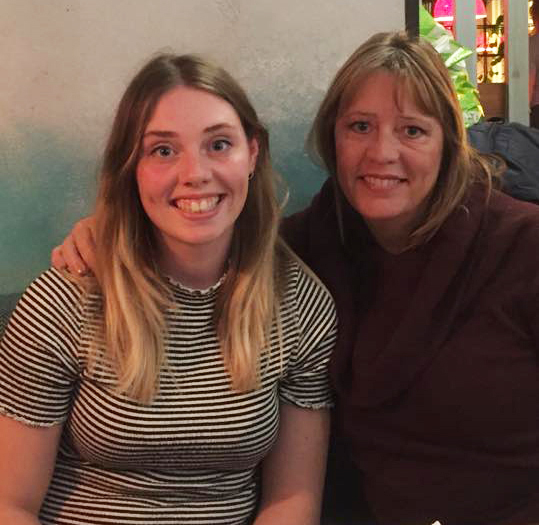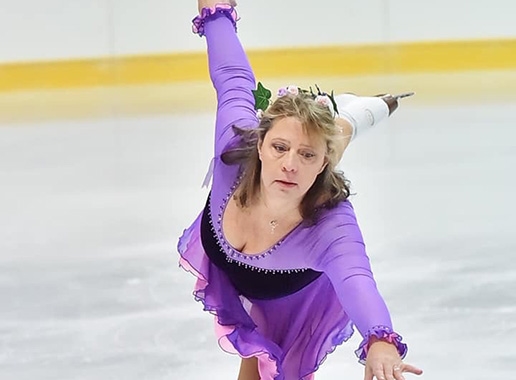- Home
- For Patients
- SCAD Stories
- Debbie
Debbie
At the age of 55, the past year had been one of the best years of my life. Having left a stressful business behind, my new job was challenging but gave me a real sense of achievement. Alongside this, my consultancy business was flourishing to the point I recently made the decision to do this full time.
My daughter was happily living her life; my mum was now in a residential home, it broke my heart but it had been a tough three years caring for her after losing my dad, so I found comfort knowing she was safe and well look after. I had rediscovered my love for ice skating and met some wonderful new friends who shared my passion for the ice and was enjoying lots of travelling and socialising again. I had just moved to a lovely house in the countryside, several holidays were booked and in a few days I was due to go skiing in Canada. Life was feeling good again.
That was until the day I started to feel very tired, different to normal and thought I may need to see the dentist as I had an uncomfortable nagging pain in my jaw. I had noticed the occasional chest pain that I put down to indigestion. The night before the event I had the strangest intense feeling like something really bad was going to happen, my thoughts turned to my mum and I hoped she was going to be OK.

The next morning, on 29 March 2018, I was getting ready to go to a meeting and I felt the most intense crushing pain in the middle of my chest, could not breathe and felt pain in my left arm and left-hand side of my neck, I became very clammy. My first-aid experience helped me realise I had classic heart attack symptoms, I was alone, so I sat on the floor with my back to the wall, tried to keep calm and breathe slowly while I called 999.
ECG looked normal
The paramedics arrived, the ECG looked OK so they took me to the hospital as a precaution. They wanted me to walk to the ambulance, which I did slowly after locking up the house. I felt very sick in the ambulance, they thought maybe I was having a panic attack.
On arrival at hospital they took my bloods and another ECG, at this stage they were not too concerned. After a wait, tests showed my Troponin level was very high and my second ECG confirmed I had suffered a heart attack.
I was suddenly rushed into resus and was surrounded by the medical team, they wanted to call my family and explained I would be taken to another hospital where they specialise in cardiology.
They gave me morphine but I had a severe reaction causing my heart to stop. I recall hearing my sister say she was at my side and then a terrible feeling and thought, “that’s it, I’m going!”
Fortunately, I came around, waking with crash pads on me and, once I was stable, they moved me to Brighton.

They couldn’t understand why I’d had a heart attack, I was reasonably fit and well with none of the usual risk factors. My cholesterol levels were good, my blood pressure is usually low, I was not on any medication for anything. They said it maybe Takotsubo cardiomyopathy, otherwise known as broken heart syndrome, which is caused by stress and mimics a heart attack.
They decided to observe me overnight and carry out a non-urgent angiogram in a few days’ time. However, the next day I had further chest pains and they decided to do an angiogram immediately.
The angiogram lasted three and half hours and was the most horrendous experience. They found my arteries clear of plaque but I had suffered a spontaneous coronary artery dissection (SCAD) in my LAD (Left Anterior Descending artery), which caused me to have a heart attack. It appears my connective tissue was fragile and during the angiogram I suffered another dissection, and the theatre team called in a professor to advise them (it was Good Friday and he was off duty). My arteries went into spasm so they had difficulty moving the catheters through my body and lying awake on the operating table while they worked out what to do was extremely distressing.
They decided not to stent the first SCAD as I may suffer another dissection but had to stent the second dissection, as I was informed “It was at the top and could not be left”. I still don’t know exactly what that meant or where the second dissection occurred. I was told I am a super-sensitive patient and the angiogram showed I have signs of a connective tissue disorder.
They gave me a one-page info sheet from the British Heart Foundation about SCAD and explained it’s very rare so they were unclear what the future will hold and I was to take one day at a time. I was in hospital for five days and was put on anti-platelet therapy. I was given very little information so researched SCAD on the internet to learn more.
Recurrent chest pain
It’s now been seven weeks, and I have been re-admitted to hospital three times with extreme chest pain and shortness of breath, similar to the first event. Each time they went through the same process: ECG, blood tests and observation and came to the conclusion that it’s too risky for any intervention, I should go home and rest.
On one occasion the registrar wanted to do another angiogram and give me morphine, and he became angry with me when I refused both. I tried to explain they both present a huge risk to me, he said: “You’ve come in for help, the choice is morphine or angiogram but you are refusing both, what do you expect me to do?” I was having difficulty talking but asked him to check my notes, which he did and then it was agreed they should not do either and just keep me in for observation.
During this time, very sadly my mum passed away and I have found it hard to grieve due to the fear it may bring on another heart attack.
I feel there’s been little progress in my recovery. I am still off work, not driving and after cancelling my trip to Canada, I just cancelled another trip to an ice skating event in Oberstdorf, Germany.
My constant ‘ups and downs’ are causing a lot of stress for my family and friends, yet they have all been amazing. My big frustration is that I am constantly told to call 999 when I get chest pains, which I still have the majority of the time. When I’ve asked my GP for help, they’ve sent me to hospital each time but the set procedure for dealing with heart attacks is not necessarily relevant to my situation, so seems a waste of everyone’s time and doesn’t explain why I am in pain. I’m frustrated by the lack of information but it appears little is known about SCAD and there needs to be more research.
My cardiac rehab nurse has been very supportive and I am now seeing a psychiatrist to help me deal with things and have seen a rheumatoid consultant, who said very little but I was sent a copy of the letter from him to the GP and it seems they are testing for Ehler Danlos Syndrome and I suspect other connective tissue disorders.
I am due to see the cardiologist in a couple of weeks’ time and have some scans booked in, but I do not feel confident about the treatment I am receiving so decided to arrange a private consultation with one of the two UK SCAD specialists, who I hope can help me understand my situation and more importantly what I can do to get back to normal life again.
I have no idea what the future holds. My goal is to compete at the International Adult Ice Skating Competition in Oberstdorf 2019 and stick around for my beautiful daughter, family & friends for as long as possible.
I am reassured that many SCAD survivors recover well enough to resume a fairly normal life again. Apart from my Cardiac Rehab Nurse, who has been very supportive, the online SCAD support community has been the only place where I can obtain further information, support and advice. Reading stories from SCAD patients, online forums, Facebook groups and information sheets has been a rock; without this I feel I would be very alone and still in the dark about my condition. This is why I decided to share my story. No doubt there will be a part two to my rather lengthy story – thank for reading.
Part 2
On 29 March 2020 it was two years since my SCAD event. The last two years have been the most difficult of my life, full of highs and lows and learning to live with the fear of it happening again. Yet, I feel it has made me a better person and I feel so much stronger than ever before. I have learnt so much about myself and how to make the most of life.
I made it through with the help of an amazing cardiac psychiatrist, my cardiac team, family & friends. These are the coping strategies I now practice and I hope sharing this will help anyone struggling right now;
- Learn to accept it. I couldn’t change or control the situation. I could choose how to respond and accepted that I needed to change my expectations and adapt to the circumstances. Life would never be the same but it doesn’t mean it couldn’t be even better.
- Make the most of the support available to you. Cardiac rehab was a real turning point for me, it gave me back the confidence I needed to start doing things again. Step by step, I slowly started going for short walks and built my exercise gradually. Now I’m fitter than I was before my SCAD heart attack!
- Find out everything you can about your condition from reliable sources and practice self-advocacy. In my case, I found many of the medical professionals were not aware of my condition or how to treat my symptoms, so I spent many hours in A&E not getting the help I needed. I have ongoing chest pain and days when it’s difficult to function normally but I have learnt how to manage these days. Mostly it involves resting and I rarely need to seek medical advice now, though I would if I was in any doubt.
- Listen to your body. The body is incredible and lets you know when things aren’t right. If you need to slow down, give yourself a break and try not to beat yourself up because you feel you should be doing ‘this’ or ‘that’. Once you feel ready you’ll have more energy to do things again.
- Look after your general health and wellbeing. Eating a healthy diet, gentle exercise and daily meditation helped me make huge strides in my recovery.
- Try to find something that brings you joy each day. When I was unable to do anything I took pleasure in simple things, like listening to the birds singing, appreciating time with my loved ones and listening to music.
- Learn to say no and focus on doing the things that really matter. My psychiatrist introduced me to the phrase ‘Is what your doing right now going to make your life richer, fuller and more meaningful?” I live by this now and for me, ice skating is my happy place. This has led to me not only taking part in the Oberstdorf Adult Skating Championships but also, The Australian Master Games, The Juna Cup in Tallinn, Estonia and the Winter World Masters Games in Innsbruck, all within the last 10 months. I’ve had the most amazing experiences and hope to do more in future.
This has been an incredible journey and probably would never have occurred if it hadn’t been for my SCAD event. I still live with the daily fear and, of course, would not recommend having a SCAD event, however I feel positive, enjoy being alive and make the most of what life brings. I’ve even found the experience is helping me cope with the current COVID-19 crisis!

